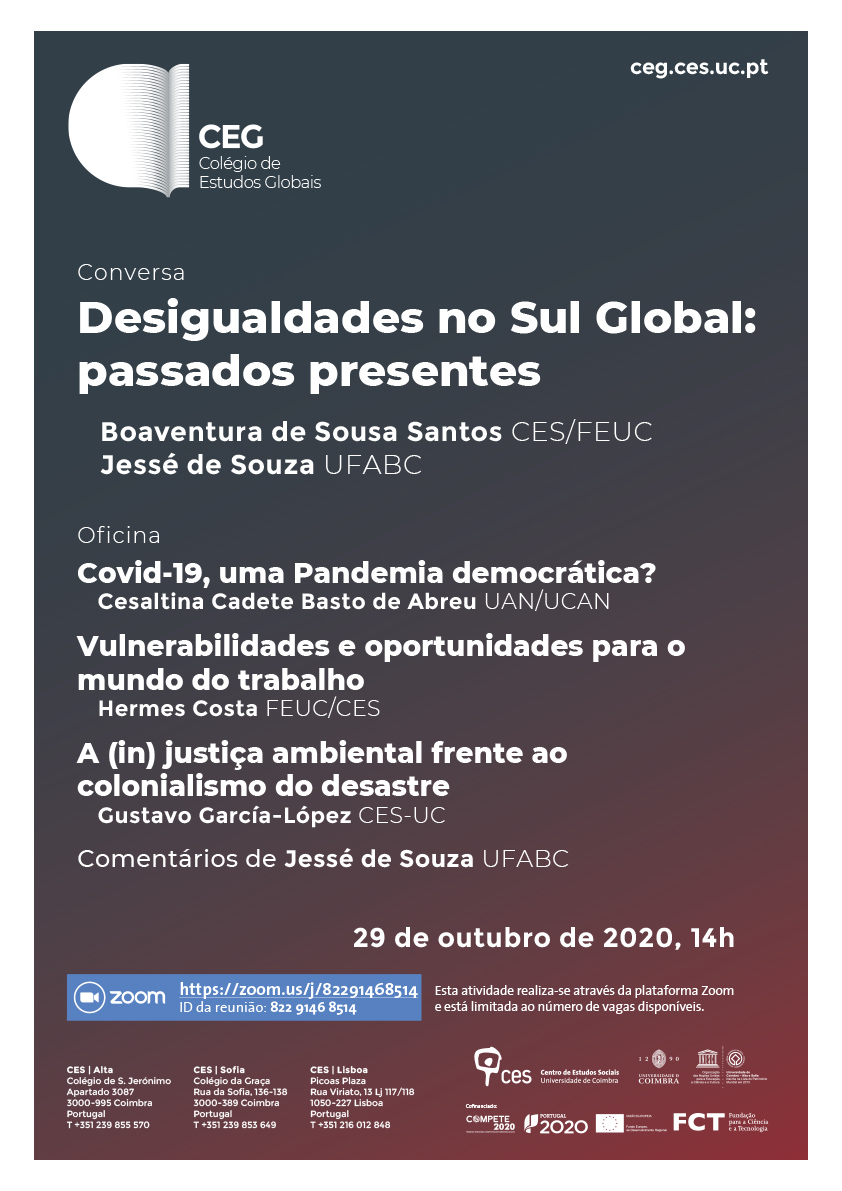Colégio de S. Jerónimo
Apartado 3087
3000-995 Coimbra,
Portugal
Tel +351 239 855 570
Colégio da Graça
Rua da Sofia nº 136-138
3000-389 Coimbra,
Portugal
Tel +351 239 855 570
Av. Defensores de Chaves
n.º16, cave dtª
1000-117 Lisboa,
Portugal

This activity will be provided through Zoom platform and doesn’t require registration. It’s limited to the number of places available.
https://us02web.zoom.us/j/82291468514
ID: 822 9146 8514
Please keep the microphone on mute until the discussion is open. The host may remove disruptive participants.
Online open access activities such as this one do not grant a declaration of participation. Such document will only be guaranteed in events with prior registration and regulated access.
______________________________________________
This session will consist of a conversation via Zoom between Jessé de Souza and Boaventura Sousa Santos (14h00-15h30), followed by a Workshop consisting of 3 interventions on Inequalities and finally a commentary by Jessé de Souza (Federal University of ABC):
Cesaltina Cadete Basto de Abreu
Faculty of Social Sciences of the Agostinho Neto University and Catholic University of Angola
Covid-19, a democratic Pandemic?
Overview:
From its inception, we have witnessed discourses about the pandemic that repeatedly mobilise words like "everyone", "We", "Together" in phrases like "the virus hits everyone", "the virus does not choose social classes", "we are all in the same boat" translating an idea of uniformity of its action and consequences by making us "all" vulnerable. This discourse omits that: a) we may all be in the same sea, but some on yachts and others without even a float, i.e. unequal conditions and opportunities and discrimination at the time of contact with the disease count; b) although contagion may be universal, following the steps and routes of globalised urbanites, its consequences are particularly felt by localised commons; c) Covid-19 has opened up inequalities embedded in relations, while maintaining the simplifications of the local-global, individual-collective, private-public, centre-periphery, north-south dichotomies, among others; d) the burden of the pandemic falls on the poorest sections of all societies, and within them, on women and girls, and other discriminated groups. The communication seeks to deconstruct these discourses and point out paths inspired by the UBUNTU philosophy to reinvent Politics, organise the Economy, and recreate Life in Society, while responding to the inequalities exposed by the pandemic within and in relations between societies.
Hermes Augusto Costa
Faculty of Economics, University of Coimbra/Centre for Social Studies
Vulnerabilities and opportunities for the labour world
Overview:
On a global scale, the current health emergency situation imposed by covid-19 puts society as a whole on hold. In the world of labour in particular, unemployment and threats of collective dismissal in temporary employment agencies, in sectors such as hotels and tourism, etc., take on dramatic proportions and reinforce the risks of inequality. Those who were already in a vulnerable situation - temporary workers, in a trial period, with fixed-term contracts, among others - seem to have reinforced this condition. There are challenges in how to 'empower' the labour factor and its most representative organisations.
Gustavo García-López
Centre for Social Studies
Environmental (in)justice in the face of disaster colonialism
Overview:
Our world is increasingly characterised by the recurrence of crises and disasters, from (wrongly) so-called "natural" ones, such as hurricanes and earthquakes, economic and war disasters, and, as has now become clear, also pathogenic disasters. This condition, although with global implications (just think about the climate crisis that threatens the whole world), is also manifested in a highly unequal way through already known categories of difference (class, gender, race, north-south). In this presentation, I propose to review these multiple layers or "faces" of environmental injustice and place them in the context of what several people call "disaster colonialism", with a look at the case of Puerto Rico, but also at the global dimension of this phenomenon. Secondly, inspired by recent discussions on decolonial perspectives in environmental justice, I relate the struggles against this policy of disaster - policy of death (bio/homicide) - to the construction of self-management projects which, instead of only addressing environmental destruction and socio-economic inequalities, promote freedom in a broader sense - a "communitarisation" of justice.